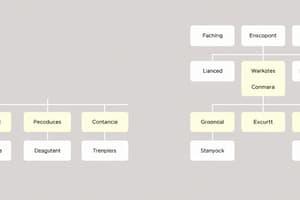Podcast
Questions and Answers
What is a key goal of the incubator in terms of organizational culture?
What is a key goal of the incubator in terms of organizational culture?
- Authority and procedure
- Team orientation and coordination
- Financial performance and growth
- Commitment to oneself and professional recognition (correct)
Which of the following is NOT a dimension of organizational culture according to the Denison Model?
Which of the following is NOT a dimension of organizational culture according to the Denison Model?
- Consistency
- Adaptability
- Finance (correct)
- Involvement
What is a characteristic of firms with a higher level of entrepreneurial orientation?
What is a characteristic of firms with a higher level of entrepreneurial orientation?
- State-owned, larger, and older
- Focused on authority and procedure
- Non-state owned, smaller, and younger (correct)
- Centralized and formalized
What is a dimension of organizational culture in the Denison Model that includes core values and coordination?
What is a dimension of organizational culture in the Denison Model that includes core values and coordination?
What is positively related to organizational performance?
What is positively related to organizational performance?
What is a characteristic of organizational relationships in the guided missile culture?
What is a characteristic of organizational relationships in the guided missile culture?
What is a key aspect of leadership in the incubator culture?
What is a key aspect of leadership in the incubator culture?
What is a result of organizational learning and innovation in entrepreneurial firms?
What is a result of organizational learning and innovation in entrepreneurial firms?
What is the outcome of combining organizational innovation and organizational learning?
What is the outcome of combining organizational innovation and organizational learning?
What is a key characteristic of entrepreneurs that enables them to learn from their mistakes?
What is a key characteristic of entrepreneurs that enables them to learn from their mistakes?
What is a key aspect of entrepreneurial behavior that helps entrepreneurs navigate challenges?
What is a key aspect of entrepreneurial behavior that helps entrepreneurs navigate challenges?
What is the primary reason entrepreneurs are willing to work hard?
What is the primary reason entrepreneurs are willing to work hard?
What is the outcome of strengthening strategic capabilities in an organization?
What is the outcome of strengthening strategic capabilities in an organization?
What is a key leadership trait that enables entrepreneurs to overcome obstacles?
What is a key leadership trait that enables entrepreneurs to overcome obstacles?
What is the primary focus of organizational learning in the context of entrepreneurship?
What is the primary focus of organizational learning in the context of entrepreneurship?
What is the relationship between organizational innovation and entrepreneurship?
What is the relationship between organizational innovation and entrepreneurship?
According to Hofstede's findings, what is the relationship between individualism, power distance, and uncertainty avoidance in terms of innovation and entrepreneurship?
According to Hofstede's findings, what is the relationship between individualism, power distance, and uncertainty avoidance in terms of innovation and entrepreneurship?
Which of the following organizational culture types, according to Trompenaars and Woolliams' model, is least likely to encourage entrepreneurship?
Which of the following organizational culture types, according to Trompenaars and Woolliams' model, is least likely to encourage entrepreneurship?
According to Johnson, what is a key requirement for entrepreneurship?
According to Johnson, what is a key requirement for entrepreneurship?
Which of the following cultural dimensions, according to Hofstede, is most closely related to economic growth and innovation?
Which of the following cultural dimensions, according to Hofstede, is most closely related to economic growth and innovation?
What is the primary difference between the 'incubator' and 'guided missile' organizational culture types, according to Trompenaars and Woolliams' model?
What is the primary difference between the 'incubator' and 'guided missile' organizational culture types, according to Trompenaars and Woolliams' model?
According to Thomas and Muller, what is the impact of collectivism on entrepreneurial propensity?
According to Thomas and Muller, what is the impact of collectivism on entrepreneurial propensity?
Which of the following is a characteristic of an entrepreneur, according to Johnson?
Which of the following is a characteristic of an entrepreneur, according to Johnson?
What is the primary benefit of a pro-innovative culture, according to Hofstede's findings?
What is the primary benefit of a pro-innovative culture, according to Hofstede's findings?
Study Notes
Organizational Innovation and Entrepreneurship
- Organizational innovation and organizational learning jointly promote organizational entrepreneurship and increase competitive advantage.
- Strengthening strategic capabilities is necessary to achieve an adequate level of organizational issues, improving performance and encouraging entrepreneurship.
Types of Entrepreneurial Behavior
- 9 types of entrepreneurial behavior, including:
- Unafraid of failure: learning from mistakes and persisting despite setbacks.
- Happy to work hard: entrepreneurs are willing to put in the effort required to start and run a business.
- Brave: standing up for oneself against adversity and opposition.
Organizational Culture and Entrepreneurship
- The incubator culture: individual self-realization, commitment to oneself, and professional recognition are key goals.
- Task-oriented culture: low degree of centralization, focus on achievement and effectiveness, and results-oriented relationships.
- The guided missile culture: strong relationship with entrepreneurship, low degree of centralization, and task and project-oriented.
Denison Model
- Links organizational culture to entrepreneurship and performance.
- Divided into four dimensions: involvement, consistency, adaptability, and mission.
Firms' Performance and Entrepreneurial Orientation
- Research shows a strong link between firm performance and entrepreneurial orientation.
- Entrepreneurial orientation is negatively correlated with ownership type, firm age, firm size, and environment.
Hofstede's Findings
- Societies with high individualism and low power distance promote innovation and entrepreneurship.
- High individualism combined with low power distance and weak uncertainty avoidance encourages a pro-innovative culture and entrepreneurship.
Entrepreneurship and Organization Culture
- Trompenaars and Woolliams' (2003) model of organizational culture has two dimensions: egalitarian vs. hierarchical and person-oriented vs. task-oriented.
- The incubator and guided missile cultures have strong links with entrepreneurship.
Defining Entrepreneurship
- Johnson's (2001) definition of an entrepreneur: takes agency and initiative, assumes responsibility and ownership, is open to and able to create novelty, manages risks, and persists despite obstacles.
Studying That Suits You
Use AI to generate personalized quizzes and flashcards to suit your learning preferences.
Related Documents
Description
This quiz explores the relationship between organizational innovation, learning, and entrepreneurship, highlighting the importance of strategic capabilities and entrepreneurial behavior.




